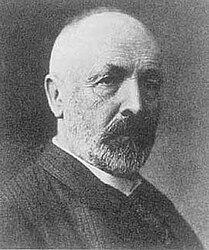Georg Cantor
| Georg Kantor | |
 | |
| Rođenje | 3. mart 1845. Petrograd |
|---|---|
| Smrt | 6. januara 1918. Hale |
| Polje | matematika |
| Institucija | Univerzitet u Haleu |
| Alma mater | ETH Cirih Univerzitet u Berlinu |
| Akademski mentor | Ernst Kumer Karl Vajerštras |
| Poznat po | teorija skupova |
Georg Kantor (nem. Georg Cantor, Petrovgrad, Rusija, 3. marta 1845— Hale, Nemačka, 6. januara 1918), nemački matematičar, utemeljivač teorije skupova.
Prvi je numeričke sisteme, poput racionalnih i stvarnih brojeva, istraživao sistematično, kao zaokružene entitete ili skupove. To pregnuće dovelo ga je do iznenaćujućeg otkrića da nisu svi beskrajni skupovi iste veličine. Dokaz za ovo je Kantorov dijagonalni postupak
Pokazao je da racionalnih brojeva ima isto koliko i prirodnih brojeva, to jest da ova dva skupa ( i ) imaju istu kardinalnost (dokaz da racionalnih brojeva ima prebrojivo mnogo je Kantorovo prebrojavanje skupa Q). Dokazao je, takođe, da takve podudarnosti nema kod znatno većeg skupa iracionalnih brojeva, te su otuda oni poznati kao skup koji se ne može prebrojati.
Istraživanja je krunisao klasifikacijom transfinitnih brojeva koji, laički govoreći, predstavljaju stepene beskonačnosti, i označavaju se simbolima , , ... (alef nula, alef jedan, ...).
Literatura
- Joseph Dauben, Joseph W. (1977), „Georg Cantor and Pope Leo XIII: Mathematics, Theology, and the Infinite”, Journal of the History of Ideas 38 (1): 85–108, JSTOR 2708842 .
- Dauben, Joseph W. (1979), Georg Cantor: his mathematics and philosophy of the infinite, Boston: Harvard University Press, ISBN 978-0-691-02447-9 .
- Dauben, Joseph (2004) [1993], „Georg Cantor and the Battle for Transfinite Set Theory”, Proceedings of the 9th ACMS Conference (Westmont College, Santa Barbara, CA), pp. 1–22, arhivirano iz originala na datum 2015-01-08, pristupljeno 2015-05-09 . Internet version published in Journal of the ACMS 2004.
- Ewald, William B., ur. (1996), From Immanuel Kant to David Hilbert: A Source Book in the Foundations of Mathematics, New York: Oxford University Press, ISBN 978-0-19-853271-2 .
- Ivor Grattan-Guinness, Ivor Grattan-Guinness (1971), „Towards a Biography of Georg Cantor”, Annals of Science 27: 345–391, DOI:10.1080/00033797100203837 .
- Ivor Grattan-Guinness, Ivor Grattan-Guinness (2000), The Search for Mathematical Roots: 1870–1940, Princeton University Press, ISBN 978-0-691-05858-0 .
- Hallett, Michael (1986), Cantorian Set Theory and Limitation of Size, New York: Oxford University Press, ISBN 0-19-853283-0 .
- Purkert, Walter; Ilgauds, Hans Joachim (1985), Georg Cantor: 1845–1918, Birkhäuser Verlag, ISBN 0-8176-1770-1 .
- Suppes, Patrick (1972) [1960], Axiomatic Set Theory, New York: Dover, ISBN 0-486-61630-4 . Although the presentation is axiomatic rather than naive, Suppes proves and discusses many of Cantor's results, which demonstrates Cantor's continued importance for the edifice of foundational mathematics.
- Cantor, Georg (1955) [1915], Philip Jourdain, ur., Contributions to the Founding of the Theory of Transfinite Numbers, New York: Dover, ISBN 978-0-486-60045-1 .
- Cantor, Georg (1874), „Ueber eine Eigenschaft des Inbegriffes aller reellen algebraischen Zahlen”, Journal für die Reine und Angewandte Mathematik 77: 258–262, DOI:10.1515/crll.1874.77.258, arhivirano iz originala na datum 2012-02-07, pristupljeno 2015-05-09 .
- Georg Cantor (1879). „Ueber unendliche, lineare Punktmannichfaltigkeiten (1)”. Mathematische Annalen 15 (1): 1–7. DOI:10.1007/bf01444101.
- Georg Cantor (1880). „Ueber unendliche, lineare Punktmannichfaltigkeiten (2)”. Mathematische Annalen 17 (3): 355–358. DOI:10.1007/bf01446232.
- Georg Cantor (1882). „Ueber unendliche, lineare Punktmannichfaltigkeiten (3)”. Mathematische Annalen 20 (1): 113–121. DOI:10.1007/bf01443330.
- Georg Cantor (1883). „Ueber unendliche, lineare Punktmannichfaltigkeiten (4)”. Mathematische Annalen 21 (1): 51–58. DOI:10.1007/bf01442612.
- Georg Cantor (1883). „Ueber unendliche, lineare Punktmannichfaltigkeiten (5)”. Mathematische Annalen 21 (4): 545–591. DOI:10.1007/bf01446819.
- Georg Cantor (1892). „Ueber eine elementare Frage der Mannigfaltigkeitslehre”. Jahresbericht der Deutsche Mathematiker-Vereinigung 1890-1891 1: 75–78.
- Cantor, Georg (1895). „Beiträge zur Begründung der transfiniten Mengenlehre (1)”. Mathematische Annalen 46: 481–512. DOI:10.1007/bf02124929. Arhivirano iz originala na datum 2014-04-23. Pristupljeno 2015-05-09.
- Cantor, Georg (1897). „Beiträge zur Begründung der transfiniten Mengenlehre (2)”. Mathematische Annalen 49: 207–246.
- Cantor, Georg (1932), Ernst Zermelo, ur., Gesammelte Abhandlungen mathematischen und philosophischen inhalts, Berlin: Springer, arhivirano iz originala na datum 2014-02-03, pristupljeno 2015-05-09 . Almost everything that Cantor wrote. Includes excerpts of his correspondence with Richard Dedekind|Dedekind (p. 443-451) and Adolf Fraenkel Cantor biography (p. 452-483) in the appendix.
- Aczel, Amir D. (2000), The Mystery of the Aleph: Mathematics, the Kabbala, and the Search for Infinity, New York: Four Walls Eight Windows Publishing . ISBN 0-7607-7778-0. A popular treatment of infinity, in which Cantor is frequently mentioned.
- Dauben, Joseph W. (June 1983), „Georg Cantor and the Origins of Transfinite Set Theory”, Scientific American 248 (6): 122–131, DOI:10.1038/scientificamerican0683-122
- Ferreirós, José (2007), Labyrinth of Thought: A History of Set Theory and Its Role in Mathematical Thought, Basel, Switzerland: Birkhäuser . ISBN 3-7643-8349-6 Contains a detailed treatment of both Cantor's and Dedekind's contributions to set theory.
- Paul Halmos, Paul Halmos (1998) [1960], Naive Set Theory, New York & Berlin: Springer . ISBN 3-540-90092-6
- Hilbert, David (1926). „Über das Unendliche”. Mathematische Annalen 95. DOI:10.1007/BF01206605.
- Hill, C. O.; Rosado Haddock, G. E. (2000), Husserl or Frege? Meaning, Objectivity, and Mathematics, Chicago: Open Court . ISBN 0-8126-9538-0 Three chapters and 18 index entries on Cantor.
- Meschkowski, Herbert (1983), Georg Cantor, Leben, Werk und Wirkung (Georg Cantor, Life, Work and Influence, in German), Vieweg, Braunschweig
- Roger Penrose, Roger Penrose (2004), The Road to Reality, Alfred A. Knopf . ISBN 0-679-77631-1 Chapter 16 illustrates how Cantorian thinking intrigues a leading contemporary Theoretical physics.
- Rudy Rucker, Rudy Rucker (2005) [1982], Infinity and the Mind, Princeton University Press . ISBN 0-553-25531-2 Deals with similar topics to Aczel, but in more depth.
- Rodych, Victor (2007), „Wittgenstein's Philosophy of Mathematics”, Edward N. Zalta, The Stanford Encyclopedia of Philosophy .
Spoljašnje veze

- O'Connor, John J.; Robertson, Edmund F. „Georg Cantor – biografija”. MacTutor History of Mathematics archive. (en)
- O'Connor, John J.; Robertson, Edmund F. „A history of set theory”. MacTutor History of Mathematics archive. (en)
- Stanford Encyclopedia of Philosophy: Set theory by Thomas Jech.
- Grammar school Georg-Cantor Halle (Saale): Georg-Cantor-Gymnasium Halle
- Poem about Georg Cantor











